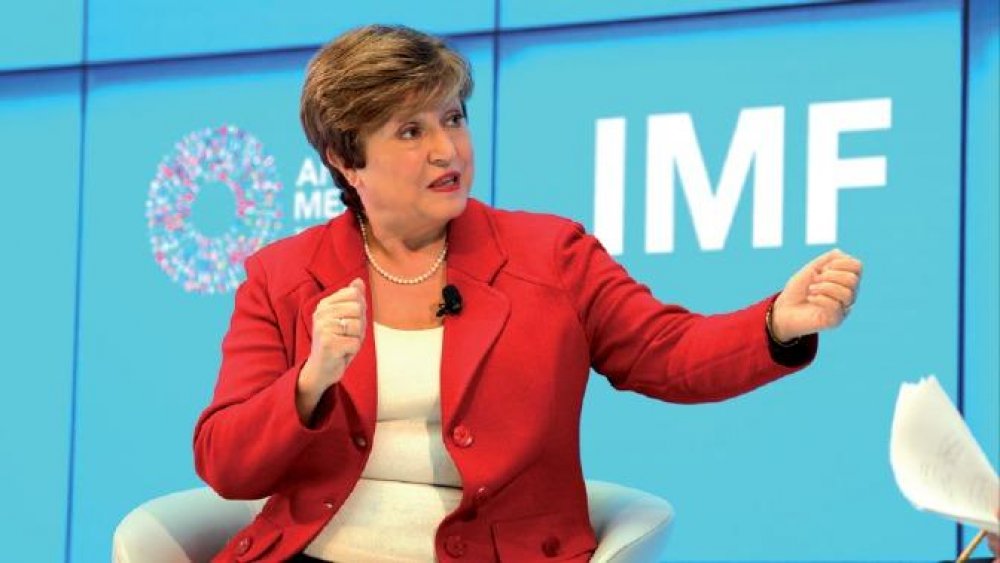Other Pages
- Opinion Poll
- About Us
- Send Your Story
- Contact Us
- Newsletter
- Privacy Policy
- Terms and Conditions

The Managing Director of the International Monetary Fund (IMF), Kristalina Georgieva, has stated that Nigeria still has difficult days ahead as the country's economy will get worse this year.
Georgieva made this known while revealing the impact COVID-19 will have on Nigeria's economy and factors that contributed to the economic downturn.
Georgieva said while COVID-19 has spread less in Nigeria, the country is still experiencing the adverse effect of the coronavirus due to some measures the government took and external factors as well, "Very seriously, Nigeria is being hit by the economic fallout of the pandemic. It is hit because of measures it takes, it is hit because of the spillover of the restriction in the world economy. Then it is then hit on top of it by the collapse of oil pricing." Georgieva said while speaking to CNBC.
Nigeria's economy to crash even more
The IMF chief said Nigeria's economy will experience a deeper contraction compared to Africa as a whole. She furthered explained that, "To put this in number, for Africa, we project contraction of one and a quarter per cent. This is going to be a deeper contraction in our prediction in Nigeria. Actually, it will go from over +2% growth to -3.4%, and while we are projecting recovery in 2021, it is going to be only a partial recovery.
"Therefore, difficult days are ahead. And in that context, we very much welcome the decisive measures taken to protect the economy and also to protect the most vulnerable people in Nigeria. And what we project in a situation when the fiscal gap is going to be quite significant somewhere in the order of $11 billion, that the injection (capital) from the fund and other multilateral financial institutions is critical, but timely."
What measures is Nigeria taking to protect the economy
In a Letter of intent the Central Bank of Nigeria (CBN) Godwin Emefiele and the Finance Minister, Zainab Ahmed sent to IMF, some of the measures Nigeria promised IMF was to not return subsidy to oil price. The IMF and World Bank had previously argued against fuel subsidy, stating that it weakens Nigeria's economy.
Even though President Muhammadu Buhari had in the past stated that he wouldn't remove the fuel subsidy due to fear of inflation, but April this year, it was removed. Ahmed and Emefiele told the IMF chief that, "The recent introduction and implementation of an automatic fuel price formula will ensure fuel subsidies, which we have eliminated, do not reemerge.”
Also, FG want Nigerians to pay more as it intends to allow cost to reflect on electricity tariff. The country has not been running a cost-reflective tariff in the power sector for years, and the Minister of Power, Saleh Mamman had stated that it is inevitable if Nigeria's power sector is to improve.
“We are also advancing in our power sector reforms – with technical assistance and financial support from the World Bank – including through capping electricity tariff shortfalls this year to N380bn and moving to full cost-reflective tariffs in 2021,” the letter to IMF chief revealed.
What IMF Wants Nigeria To do
Georgieva said international financial institutions would play their part to support Nigeria in closing the fiscal gap, but Nigeria also needs to take measures that will close the gap between expenditure and revenue. Recall the Finance Minister had previously stated that Nigeria doesn't have a debt problem, rather, the country has revenue problems.
This led to a review of several policies, including the increase of VAT from 5% to 7.5%. Now, Georgieva said Nigeria needs to reprioritise spending - thereby ensuring expenditure reflects on revenue - and encourage domestic borrowing which has been affected by high-interest rates.
"We expect that collectively with the World Bank, the African Development Bank, and now the Partners of Nigeria, we can fill this gap halfway through. And then the country itself can take measures, reprioritise spending, and make sure that there is increase in domestic borrowing, so the economy can weather this difficult time." Georgieva said.
She added, "We also very much welcome the fact that Nigeria actively ask for more accountability to the citizens of Nigeria in the money they get."
What's the big deal with domestic borrowing
IMF's advise on increase in domestic borrowing follows the criticism of Nigeria's interest rates by Bola Tinubu, the ruling party's (APC) national leader, who was two-time Lagos State Governor. He said the interest rates have not encouraged domestic borrowing which will aid domestic investment and job creation.
Domestic borrowing is a catalyst for business growth, as it enables local businesses; especially small and medium firms, to expand. It also spur business development and nurtures innovation across all sectors. But due to high-interest rates, SMEs are reluctant to obtain loans, thereby, not allowing businesses to grow at an optimum pace.
0 Comment(s)